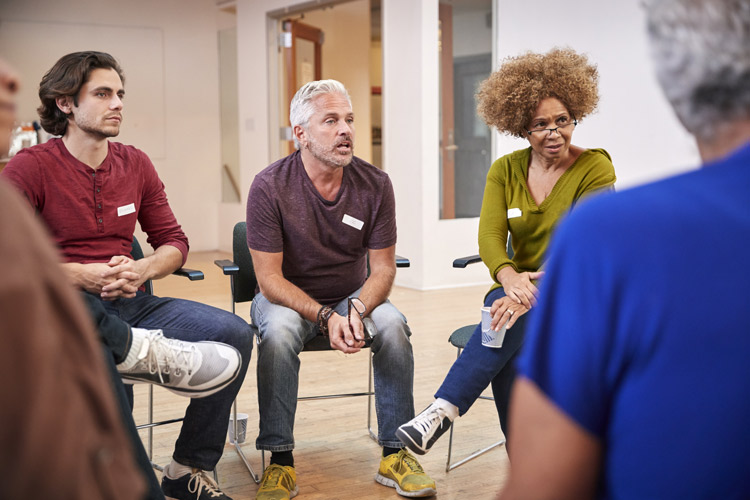 Support from friends and family is a vital part of the recovery process. While you can’t force your loved one who is abusing prescription opioid painkillers to seek treatment, there are several things you can do to help them recognize the severity of the problem and urge them to get the care they need.
Support from friends and family is a vital part of the recovery process. While you can’t force your loved one who is abusing prescription opioid painkillers to seek treatment, there are several things you can do to help them recognize the severity of the problem and urge them to get the care they need.
Educate Yourself
When it comes to helping someone with an addiction, knowledge is power. To better understand the signs and symptoms of prescription opioid addiction, refer to these St. Joseph Institute for Addiction blog posts:
- A Look at Pennsylvania’s Opioid Epidemic
- Unintended Addictions to Prescription Painkillers Pose a Serious Threat
- Everything You Need to Know About Opioid Overdoses
- Alcohol and Opioids Are a Deadly Combo
- How Does Medication-Assisted Treatment for Opioid Addiction Work?
Prescription drug abuse often goes unrecognized because of the misconception that anything prescribed by a doctor must be safe. Although prescription opioids have recognized benefits for treating chronic pain, they are highly addictive when not used precisely as directed.
Prescription drug addiction is just as serious as an addiction to alcohol or illegal street drugs. In fact, many people who abuse heroin started with an addiction to prescription painkillers.
Fight Addiction-Related Stigma
Addiction doesn’t discriminate. People of all ages, races, genders, and socio-economic backgrounds struggle with addiction. Substance use disorders are chronic illnesses with biologically based risk factors and environmental triggers. They are not caused by a character defect or a lack of willpower. Someone can have a great job and be actively involved in the community yet still struggle with addiction.
Fighting stigma means using language that doesn’t add to the guilt or shame your loved one already feels about their behavior. Stating how their behavior makes you feel, expressing your concern, and providing an opportunity for them to speak honestly is the best approach.
Stop Enabling the Behavior
Watching someone you love struggle with addiction is difficult, but it’s important to make sure your attempts to “help” are not inadvertently enabling the behavior. Do not make excuses for your loved one’s actions, such as saying they are abusing prescription opioids because there is no other way to control their chronic pain. Do not lie to others on their behalf, such as calling into work for them or canceling plans with friends and family.
Attending a support group for people dealing with a loved one’s addiction can help you better understand what constitutes enabling. Nar-Anon is one of the best-known support groups for people who have been affected by a family member or friend’s addiction. This includes addictions to prescription opioid medication as well as illegal street drugs.
Keep All Medications in a Safe Place
People who are abusing prescription medication will often buy pills on the black market or try to steal them from others. If you must take medication for a diagnosed medical condition, keep your prescriptions in a locked box in a secure location. For added security, you can purchase special locking caps for each individual pill bottle.
If you have medications in your home that are no longer needed, take steps to make sure they are disposed of properly. FDA.gov explains how to safely discard unused over-the-counter drugs or prescription medications.
Prepare for the Possibility of an Overdose
Someone who is actively abusing prescription opioids places themselves at risk of a fatal overdose, especially when they are mixing prescription painkillers with alcohol or other medication. If you believe your loved one is addicted, you can help keep them safe by keeping naloxone available in the event of an overdose.
Naloxone is a medication that temporarily blocks the effects of opioid overdose and restores normal breathing so a person can be properly treated in an emergency room. In Pennsylvania, there is a standing order issued by Rachel Levine, M.D., Pennsylvania Physician General, that allows you to obtain naloxone from most pharmacies without seeing a family doctor. The Pennsylvania governor’s website explains how to request naloxone and receive free training on how to use the drug properly.
Don’t Give Up
Convincing someone with an addiction to seek help isn’t easy. It may take you multiple tries before they agree to enter a treatment program. This is frustrating, but it’s important not to give up.
Sometimes, enlisting the support of others can help you convince your loved one to seek help. See our post on How to Plan an Intervention to learn more.
To learn more about SJI Pennsylvania opioid addiction treatment, and our programs, please contact us at (814) 228-8881.

